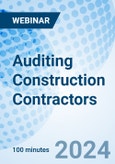Gain tools and learn concepts to perform and report on an effective audit.
Construction cost has a number of unique cost elements and methodologies that are not found in other audit assignments. An auditor can identify cost protocols that are consistently followed by the audit subject and reasonable under GAAP but are not allowable under the contract agreement, general conditions, or other prescriptive documents. Finally, the notion of sampling coverage can be misleading in a construction cost environment. This presentation will identify what makes construction cost and cost auditing unique and give the attendees the tools and concepts to perform and report on an effective audit. Subjects such as labor costs and burdens, field overheads and home office cost allocations, equipment cost challenges, and how to identify milestones of the project headed for overruns or contract non-compliance issues that are not yet apparent but can be identified with proper audit inquiries.
Learning Objectives
- You will be able to define unique construction cost elements and related challenges.
- You will be able to discuss the key risk areas in a construction cost audit.
- You will be able to explain how to perform a labor cost audit.
- You will be able to identify the key documents necessary to perform a project cost audit.
Agenda
Introduction
- Welcome
- What to Expect
- Topics Overview/Roadmap
Professional Standards
- CPA, Cfe, Naca Standards
- Common Themes
- Subject Matter Knowledge/Training
- Objectivity/Independence
- Gathering Evidence
- Reporting
- Types of Audits/Audit Objectives
- Cost Incurred Audits.
- Financial Statement Audits
- Dispute Related Audits
Supporting Documents
- The Contract and General Conditions
- The Bid and Available Supporting Documents
- Change Orders Cost Calculations and Submissions
- Complete Project Cost Report Summary
- Complete Project Cost Report Transaction Details
- Subcontractor Files Including Subcontracts, Correspondence, Payments Applications, Change Order Submissions
- Labor Cost Calculations and Supporting Documents
- Payment Applications
Audit Program Summary
- Read the Full Contract (RTFC)
- Interview Audit Subject(S)
- Identify High Risk Areas
- Prepare Document Request
- Test Documents Received and Follow-up Where Indicated
- Check Back Findings With Audit Subject(S)
- Prepare Report of Findings
- Provide Suggestions, Next Steps
Hot Topics - High Risk Areas
- Labor
- Owned Equipment
- General Conditions
- Home Office Allocations
- Billing Ahead of Progress
- Estimate to Complete
Key Reconciliations
- Jcr to G/L
- Payroll Burden/Allocated Billed Versus Incurred
- Cost Incurred vs Cost Billed vs Cost Estimate
- Revenue Recognition for GAAP
Special Situations
- Shared Savings
- Government Contracts
- Far Compliance (Far 31.205)
- Owned Equipment
- Litigation Support
- Documentation Control
- Cost Overrun Analysis
Questions
Speakers

Dennis L. Allen, CPA, CFE, CCA,
FACX Global- Founder of FACX-Global
- Over 40 years of experience in project cost audits, dispute resolution of contract and cost related issues, and government contract disputes including both domestic and international million and billion dollar projects
- Conducts seminars and lectures on project cost audits, audit objectivity, project management, change order management, and construction contracts
- Certified Public Accountant, Certified Fraud Examiner, Certified Construction Auditor with memberships in the associated professional organizations
- B.A. degree in business administration, Texas Tech University
Who Should Attend
This live webinar is designed for accountants, CPAs, controllers, CFOs, tax managers, finance directors, accounts payable professionals, and bookkeepers.









